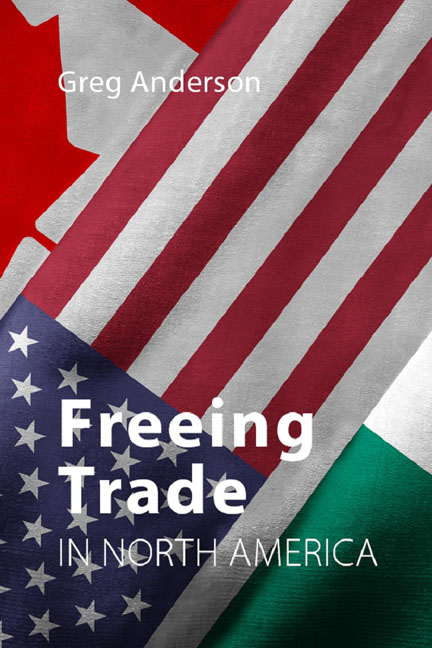Book contents
- Frontmatter
- Contents
- Introduction
- 1 The North American Idea
- 2 What the NAFTA is (and is not)
- 3 North America as Region
- 4 New Ground Broken and (Mixed?) Results
- 5 Much ado about Foreign Direct Investment
- 6 Governance in the NAFTA, or Lack Thereof?
- 7 Labour and the Environment
- 8 NAFTA 2.0: Did the Usmca Modernize Anything?
- Appendix 1 Spaghetti Bowl of Commitments by the 12 Trans-Pacific Partnership Signatories
- Appendix 2 US Trade in Goods and Services With NAFTA Partners, 1989–2017
- References
- Index
6 - Governance in the NAFTA, or Lack Thereof?
Published online by Cambridge University Press: 24 August 2023
- Frontmatter
- Contents
- Introduction
- 1 The North American Idea
- 2 What the NAFTA is (and is not)
- 3 North America as Region
- 4 New Ground Broken and (Mixed?) Results
- 5 Much ado about Foreign Direct Investment
- 6 Governance in the NAFTA, or Lack Thereof?
- 7 Labour and the Environment
- 8 NAFTA 2.0: Did the Usmca Modernize Anything?
- Appendix 1 Spaghetti Bowl of Commitments by the 12 Trans-Pacific Partnership Signatories
- Appendix 2 US Trade in Goods and Services With NAFTA Partners, 1989–2017
- References
- Index
Summary
Lack thereof?
One of the most important, and persistent, critiques of the NAFTA, which has already been touched on several times, is that it lacks a robust institutional structure. However, the NAFTA is not without governance institutions. Indeed, the NAFTA as a whole can be considered a set of institutions, since the rules it establishes, the trade it frees through tariff liberalization and the affirmation of concepts such as national treatment around a host of issue areas are by definition forms of governance.
In fact, until it was recently rediscovered and popularized as behavioural economics, the niche discipline of institutional economics focused on the impact of the “scaffolding” of both formal and informal rules in structuring the behaviour of economic decision-makers. This analytical approach to the study of institutions has included everything from the theory of the firm (its organizational structure) to how legal institutions structure the long-term macroeconomic performance of countries and regions (Coase 1937; Williamson 1998; de Soto 2001). As Douglass North writes,
Institutions are the humanly devised constraints that structure political, economic and social interaction. They consist of both informal constraints (sanctions, taboos, customs, traditions, and codes of conduct), and formal rules (constitutions, laws, property rights) … Institutions provide the incentive structure of an economy; as that structure evolves, it shapes the direction of economic change towards growth, stagnation, or decline.
(North 1991: 97)Under these terms, the NAFTA certainly qualifies as a set of institutions. However, when critics of the NAFTA argue that the agreement lacks enough of an institutional structure, they are, first, talking about the design of “formal” institutions and, second, whether they pool enough sovereignty within them to act as the arbiters of disputes around a broader set of rules. The domestic rule of law is, of course, enforceable via the state’s monopoly over the exercise of coercive power. This volume has already noted in several places the ways in which enforcement power between states is less readily found, among them the discussion of foreign direct investment and the historical absence of the rule of law governing flows.
- Type
- Chapter
- Information
- Freeing Trade in North America , pp. 121 - 138Publisher: Agenda PublishingPrint publication year: 2019



